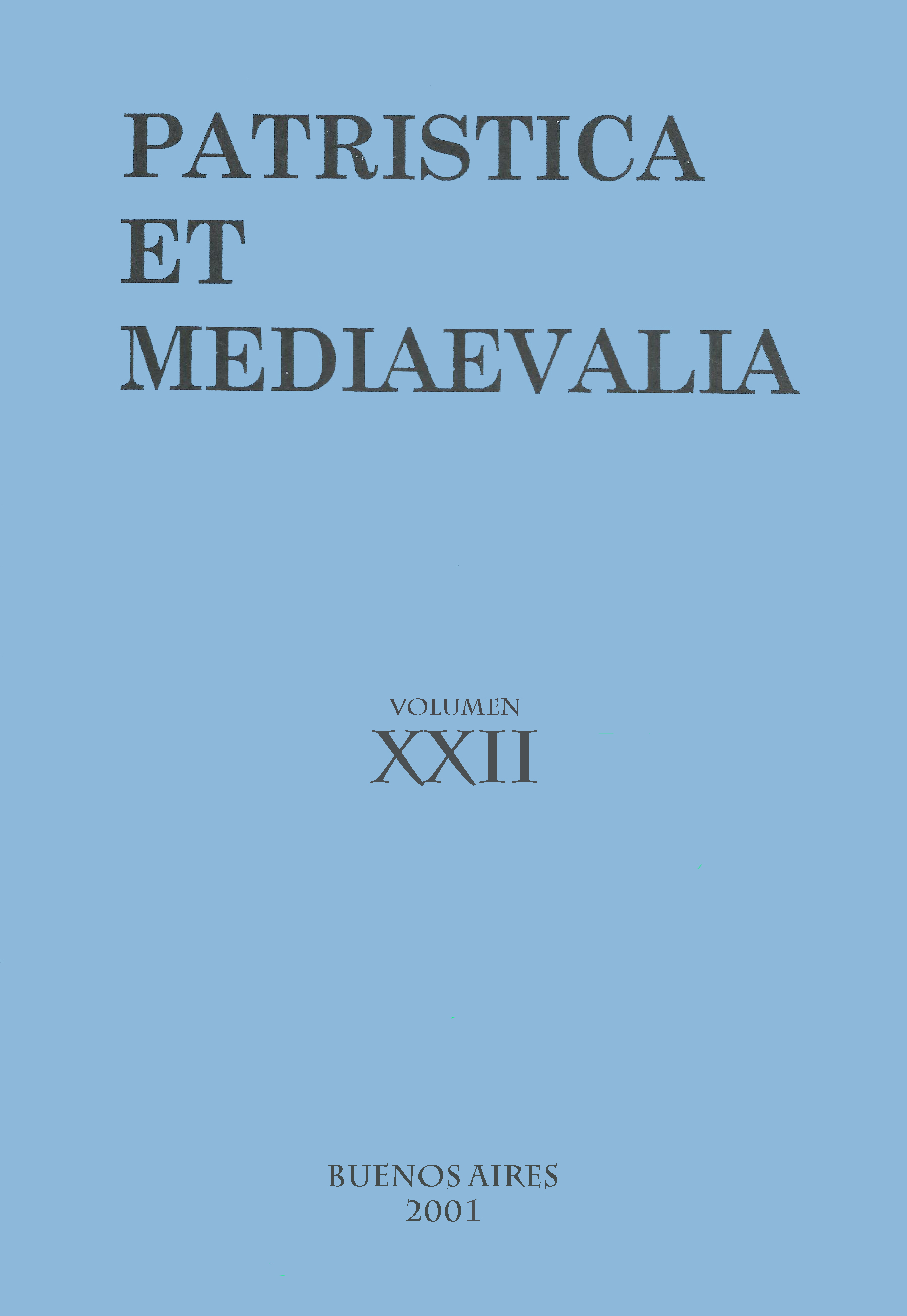Alcuin of York and His Epistolario
Abstract
This paper deals with Alcuin of York’s thinking and personality reflected in his letters. It is an analysis of the different types of Alcuin’s epistles: doctrinal, friendship, officials (according to his roles as an abbot, a royal court functionary and an educator), and other author’s letters. It is possible to discover in these letters many aspects of the political, ecclesiastical and theological matters in the Charlemagne’s age as well as a human and personal face of Alcuin of York.Downloads
References
Allot, S. (1974). Alcuin of York: His Life and Letters. York: Ebor Press.
Amiet, R. (1953). Le prologue Hucusque et la table des Capitula du Supplément d’Alcuin au Sacramentaire Grégorien. Scriptorium, 7, 177-209.
Amman, E. (1937). L’époque carolingienne. Paris: Bloud et Gay.
Born, L. (1933). The Specula Principis of the Carolingian Renaissance. Revue belge de philologie et d’histoire, 12, 581-612.
Browne, G. (2006). Alcuin of York: Lectures Delivered in The Cathedral Church Of Bristol In 1907 And 1908. Whitefish MT: Kessinger Publishing.
Bullough, D. (1991). Alcuin and the Kingdom of Heaven, Liturgy, Theology, and the Carolingian Age. In Bullough, D. Carolingian Renewal: Sources and Heritage. Manchester/New York: Manchester University Press, 161-239.
Cavadini, J. (1991). The Sources and Theology of Alcuin’s ‘De fide sanctae et individuae Trinitatis’. Traditio, 46, 123-146.
Constable, G. (1976). Letters and letter-collections. Turnhout: Brepols.
Dauchy, J. M. (1980). La pédagogie d’Alcuin d’après son oeuvre. Lille, Diss. Doct.
De Clercq, C. (1936). La législation religieuse franque de Clovis à Charlemagne. Louvain: J. E. Buschmann.
Deug-Su, I. (1979). La ‘Secularis potestas’ nei primi ‘specula’ carolingi. Convegni del Centro di Studi sulla spiritualità Medievale XVIII. Todi, 363-435.
Deug-Su, I. (1984). Cultura e ideologia nella prima età carolingia. Roma: Istituto Storico Italiano per il Medio Evo.
Driscoll, M. S. (1999). Alcuin et la pénitence à l’époque Carolingienne (Liturgiewissenschafliche Quellen und Forschungen). Münster: Aschendorff.
Duckett, E. S. (1951). Alcuin, Friend of Charlemagne. New York: MacMillan.
Ellard, G. (1956). Master Alcuin: Liturgist, A partner of Our Piety. Chicago: Loyola University Press.
Fiske, A. (1961). Alcuin And Mystical Friendship. Studi Medievali, 2, 549-575.
Forti, G. (1967). Il fondamento del pensiero pedagogico di Alcuino. Rassegna di scienze filosofiche, 20, 30-63/ 110-138.
Gaskoin, C. J. B. (1966). Alcuin: His Life and His Work. New York: Russell & Russell.
Godman, P. (1987). Poets and Emperors, Frankisch Politics and Carolingian Poetry. Oxford: Clarendon Press.
Halphen, L. (1947). Charlemagne et l’empire carolingien. Paris: Albin Michel.
Kleinclausz, A. (1934). Charlemagne. Paris: Hachette.
Kleinclausz, A. (1948). Alcuin. Paris: Les Belles Lettres.
Laforet, J. B. (1898). Histoire d'Alcuin, moine anglo-saxon, natif d'York, restaurateur des sciences en Occident sous Charlemagne. Sa vie, ses écrits, son influence sur la formation de l'Europe, sa mort ; persistance de l'impulsion littéraire d'Alcuin pendant le moyen âge et jusqu'aux temps modernes. Namur: Balon-Vincent.
Leclercq, J. (1946). Le genre épistolaire au Moyen Âge. Revue du Moyen Âge Latin, 2, 63-70.
Levillain, L. (1932). Le couronnement impérial de Charlemagne. Revue d’histoire de l’Église de France, 18(78), 5-19.
Levison, W. (1946). England and the Continent in the Eight Century. Oxford: Clarendon Press, 314-323.
Lohrmann, D. (1993). Alcuin Korrespondenz mit Karl dem Grossen über Kalender und Astronomie. In Butzer, P. & Lohrmann, D. (eds.). Science in Western and Eastern Civilization in Carolingian Times. Basel/Boston/Berlin: Birkhauser, 79-114.
Lorentz, F. (1837). The Life of Alcuin. California: The University of California Libraries.
Mattei-Cersaoli, L. (1948). Una lettera inedita di Alcuino. Benedictina, 2, 227-230.
Matter, E. A. (1990). Alcuin’s Question-and-Answer Texts. Rivista di Storia de la Filosofia, 45(4), 645-656.
Morrison, K. (1964). The Two Kingdoms: Ecclesiology In Carolingian Political Thought. Princeton: Princeton University Press.
Norberg, D. (1999). Manuale di latino medievale. Salerno: Avagliano Editore.
Page, R. B. (1909). The Letters of Alcuin. PhD Dissertation, Columbia University.
Rivera, J. F. (1941). A propósito de una carta de Alcuino recientemente encontrada. Revista Española de Teología, 1, 418-433.
Rochais, D. (1951). Le liber De virtutibus et vitiis d’Alcuin. Revue Mabillon, 41, 77-86.
Scheibe, F. C. (1958). Alcuin und die Admonitio Generals. Deutsches Archiv für Erforschung des Mittelalters, 14, 221-229.
Sickel, Th. (1875). Alcuinstudien I. Wien: gerold.
Sturgeon, T. G. (1953). The Letters of Alcuin, Part I, The Aachen Period (782-796). PhD Dissertation, Harvard University.
Wallach, L. (1955). Alcuin On Virtues and Vices, A Manual for a Carolingian Soldier. The Harvard Theological Review, 48(3), 175-195.
Wallach, L. (1955). Alcuin On Sophistry. Classical Philology, 50(4), 259-261.
Wallach, L. (1959). Alcuin and Charlemagne, Studies in Carolingian History and Literature. Ithaca: Cornell University Press.
Wilmot-Buxton, E. M. (1922). Alcuin. New York: P. J. Kenedy.
1. The authors who publish in this magazine accept the following conditions:
-
They retain the copyright and grant to the magazine the right of the first publication, with the work registered under the Attribution-ShareAlike 4.0 International License that allows third parties to use what is published as long as they mention the authorship of the work and the first publication in this magazine.
-
They can make other independent and additional contractual agreements for the non-exclusive distribution of the version of the article published in this magazine (eg. include it in an institutional repository or publish it in a book) provided that they clearly indicate that the work was first published in this journal.
-
They are allowed and recommended to publish their work on the Internet (for example on institutional or personal pages).
2. AutoArchive Conditions. Authors are allowed and encouraged to distribute post-print electronic versions of their manuscripts because it promotes their circulation, a possible increase of quotation and a major reach among the Academic community. Color RoMEO: blue.













